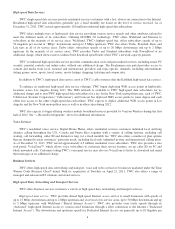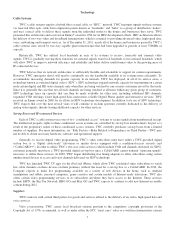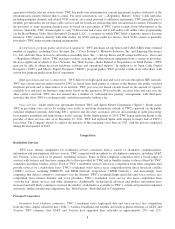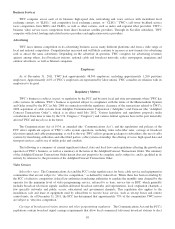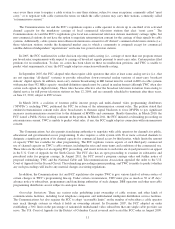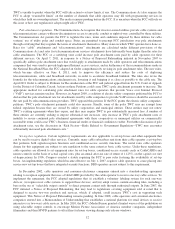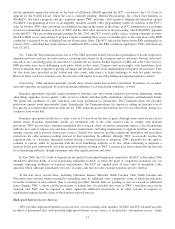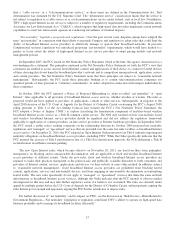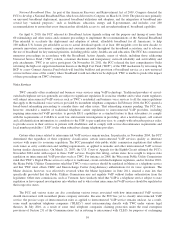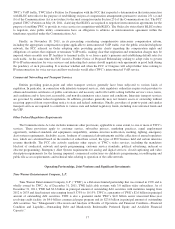Time Warner Cable 2011 Annual Report Download - page 22
Download and view the complete annual report
Please find page 22 of the 2011 Time Warner Cable annual report below. You can navigate through the pages in the report by either clicking on the pages listed below, or by using the keyword search tool below to find specific information within the annual report.not discriminated against the network on the basis of affiliation. MASN appealed the FCC’s decision to the U.S. Court of
Appeals for the Fourth Circuit, where the case is currently pending. Herring Broadcasting, Inc., which does business as
WealthTV, also filed a program carriage complaint against TWC and other cable operators alleging discrimination against
WealthTV’s programming in favor of an allegedly similarly situated video programming vendor in violation of the FCC’s
rules. In October 2009, after convening an evidentiary hearing on the merits of the claim, an FCC Administrative Law Judge
issued a recommended decision in favor of TWC and the other cable operators in the proceeding, which WealthTV appealed
to the full FCC. This proceeding remains pending. In July 2011, the FCC issued a public notice, seeking comment on issues
related to RSN access and carriage to prepare a report examining those issues six months prior to the expiration of the RSN
conditions, as required by the Adelphia/Comcast Transactions Order. The FCC released its report on the RSN marketplace in
January 2012, concluding that in the absence of additional FCC action, the RSN conditions applying to TWC will expire on
July 13, 2012.
Tax. Under the Telecommunications Act of 1996, DBS providers benefit from federal preemption of locally imposed or
administered taxes and fees on video services, including those borne by the Company and its customers. Several states have
enacted or are considering parity tax measures to equalize the tax and fee burden imposed on DBS and cable video services.
DBS providers have been challenging such parity efforts in the courts, Congress and, increasingly, state legislatures in an
effort to maintain their competitive pricing advantage and preclude states from implementing such parity tax measures. Thus
far, the states have prevailed in the federal and state courts with respect to legal challenges to such tax parity statutes.
However, there can be no assurance as to the outcome with respect to cases still pending and ongoing legislative efforts.
Franchising. Cable operators generally operate their systems under non-exclusive franchises. Franchises are awarded,
and cable operators are regulated, by state franchising authorities, local franchising authorities, or both.
Franchise agreements typically require payment of franchise fees and contain regulatory provisions addressing, among
other things, upgrades, service quality, cable service to schools and other public institutions, insurance and indemnity bonds.
The terms and conditions of cable franchises vary from jurisdiction to jurisdiction. The Communications Act provides
protections against many unreasonable terms. In particular, the Communications Act imposes a ceiling on franchise fees of
five percent of revenues derived from cable service. TWC generally passes the franchise fee on to its subscribers, listing it as
a separate item on the bill.
Franchise agreements usually have a term of ten to 15 years from the date of grant, although some renewals may be for
shorter terms. Franchise agreements usually are terminable only if the cable operator fails to comply with material
provisions. TWC has not had a franchise terminated due to breach. After a franchise agreement expires, a local franchising
authority may seek to impose new and more onerous requirements, including requirements to upgrade facilities, to increase
channel capacity and to provide various new services. Federal law, however, provides significant substantive and procedural
protections for cable operators seeking renewal of their franchises. In addition, although TWC occasionally reaches the
expiration date of a franchise agreement without having a written renewal or extension, TWC generally has the right to
continue to operate, either by agreement with the local franchising authority or by law, while continuing to negotiate a
renewal. In the past, substantially all of the material franchises relating to TWC’s systems have been renewed by the relevant
local franchising authority, though sometimes only after significant time and effort.
In June 2008, the U.S. Court of Appeals for the Sixth Circuit upheld regulations adopted by the FCC in December 2006
intended to limit the ability of local franchising authorities to delay or refuse the grant of competitive franchises (by, for
example, imposing deadlines on franchise negotiations). The FCC has applied most of these rules to incumbent cable
operators which, although immediately effective, in some cases may not alter existing franchises prior to renewal.
At the state level, several states, including California, Kansas, Missouri, North Carolina, Ohio, South Carolina and
Wisconsin, have enacted statutes intended to streamline entry by additional video competitors, some of which provide more
favorable treatment to new entrants than to existing providers. Similar bills are pending or may be enacted in additional
states. Despite TWC’s efforts and the protections of federal law, it is possible that some of TWC’s franchises may not be
renewed, and TWC may be required to make significant additional investments in its cable systems in response to
requirements imposed in the course of the franchise renewal process.
High-speed Internet Access Services
TWC provides high-speed Internet access services over its existing cable facilities. In 2002, the FCC released an order
in which it determined that cable-provided high-speed Internet access service is an interstate “information service” rather
14


